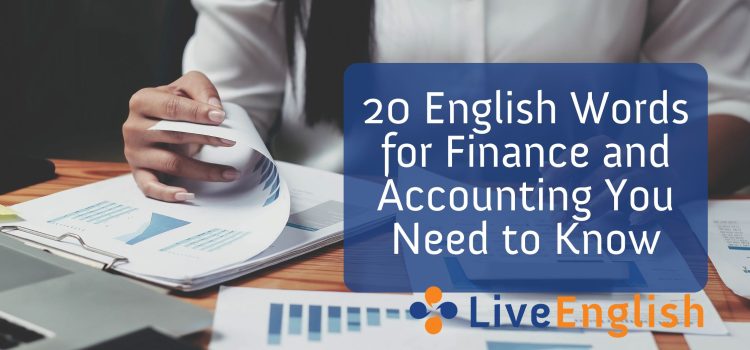
Finance and accounting English can seem like a maze of complex terms and jargon, but understanding the basics is important for developing your business English vocabulary and improving as a business professional in the finance field. Here are some essential terms to get you started:
-
- Assets – Anything of value owned by a person or business. Example: The company’s assets include its real estate holdings, machinery, and the patents on its unique products.
- Liabilities – Debts or obligations owed to others. Example: Due to several outstanding loans, the firm’s liabilities have significantly increased this year.
- Revenue – Income generated from sales or services. Example: In the last quarter, our revenue from the new product line surpassed all expectations.
- Expenses – Costs incurred in running a business. Example: The company’s expenses for this month included a significant amount for marketing and advertising.
- Profit – Revenue minus expenses. Example: After deducting all operating costs, the store reported a profit of $10,000 for the month.
- Balance Sheet – A financial statement showing assets, liabilities, and equity. Example: The balance sheet for the year-end showed a healthy equity position and a decrease in long-term debts.
- Income Statement – Summarizes revenue, expenses, and profit over a period. Example: The income statement for the year displayed an impressive growth in revenue, although the expenses also rose.
- Cash Flow – The movement of money in and out of a business. Example: Monitoring our cash flow statement has been crucial in ensuring the business remains solvent during these challenging times.
- Depreciation – Decrease in the value of assets over time. Example: The company factors in depreciation when calculating the value of its physical assets over time.
- Audit – Examination of financial records for accuracy. Example: Every year, an external firm conducts an audit of our financial statements to ensure transparency and compliance.
- Interest – The cost of borrowing money or the return on investment for lending money, typically expressed as a percentage. Example: We paid 5% interest annually on the business loan we secured last year.
- Diversification – The strategy of spreading investments across different asset classes to reduce risk. Example: To safeguard against market volatility, Jessica believes in the importance of diversification in her investment portfolio.
- Fiscal Year – A 12-month accounting period used by businesses or governments for financial reporting and budgeting. Example: Our company’s fiscal year ends in September, so we’re currently preparing for year-end financial reporting.
- Stock – A share of ownership in a company, representing a claim on a portion of the company’s assets and earnings. Example: XYZ’s stock has been performing well, attracting many investors.
- Amortization – The process of spreading the cost of an intangible asset over its useful life, often applied to loans or mortgage payments. Example: The amortization schedule for the company’s patents spreads the cost over 15 years.
- Bond – A debt security that represents a loan made by an investor to a government or corporation. Example: The government issued a new bond to raise funds for infrastructure projects.
- Credit rating – Also known as a credit score or credit score, credit rating is a numerical representation of someone’s ability to repay any new loans. Example: After consistently paying off his credit card bills on time, John noticed an improvement in his credit rating.
- Recession – The period of significant decline in a country’s economy that typically lasts for several months or even years. Example: The global economy faced a major recession in 2008, impacting millions of jobs and businesses.
- Mortgage – A type of loan specifically used to purchase real estate, typically homes. Example: Jane secured a 30-year mortgage at a fixed rate for her new home.
- Shares – A share is a unit of ownership in a company. When you own shares in a company, you are essentially a shareholder. Example: Mark purchased 100 shares of XYZ, believing in the company’s long-term growth potential.
Take your career to the next level
Understanding and developing finance and accounting expressions in English is a valuable skill that opens doors to global opportunities, improves financial literacy, and enhances career prospects in the finance and business world. It’s an investment in both personal and professional growth.
Practice these English words and expressions with our online teachers in Finance and accounting English course.
Register for a free trial lesson and improve your career today. 👇

